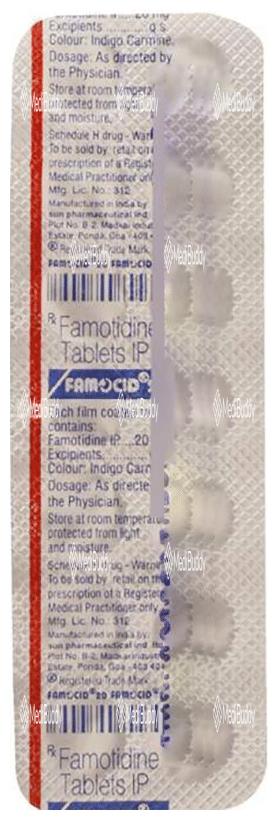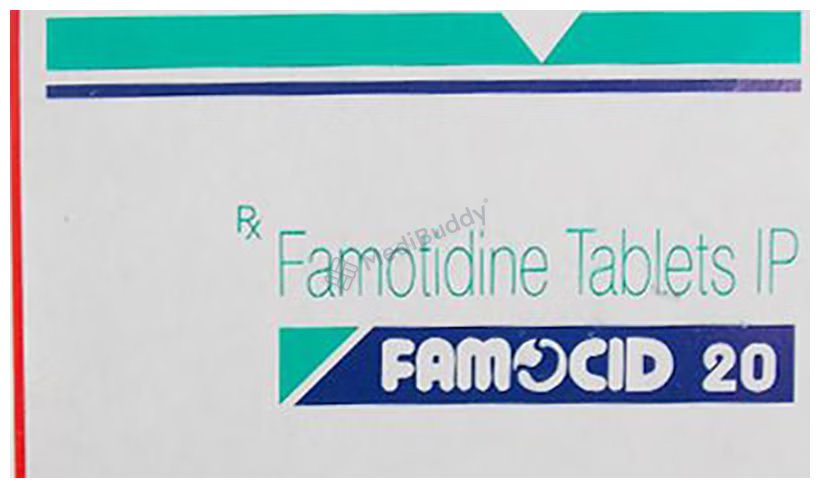Famocid 20 Tablet
By Famocid
Rx
14 Tablet in a Strip

Composition
Famotidine(20mg)

Manufacturer - Sun Pharmaceutical Industries Ltd
Plot no 107/108,Namli block , Ranipool, East Sikkim 737135

Expires on or after
September, 2027
About Famocid 20 Tablet
Famocid 20 Tablet is an antacid medication that works by reducing the production of acid in the stomach. It is commonly used to treat various stomach-related issues such as heartburn, indigestion, stomach ulcers, reflux disease, and other rare conditions. Additionally, Famocid 20 Tablet is prescribed to prevent stomach ulcers and heartburn caused by the use of certain painkillers.
It is important to take Famocid 20 Tablet as per the dosage and duration recommended by your doctor. The tablet should be swallowed whole with water before or after a meal. Typically, this medication helps alleviate indigestion and heartburn within a few hours. However, if symptoms persist or worsen after 14 days of treatment, consulting a doctor is advisable. It is not advised to use this medicine in cases of severe stomach disease.
While most individuals do not experience side effects when taking Famocid 20 Tablet, common ones may include headache, dizziness, drowsiness, diarrhea, and constipation. These side effects are usually mild and tend to go away once the medication is discontinued or the body adjusts to it. If any side effects persist or become bothersome, consulting a healthcare provider is recommended.
Prior to taking Famocid 20 Tablet, it is essential to inform your doctor about any existing kidney or liver diseases, as they may impact the prescribed dosage. It is also important to disclose any other medications being taken to prevent potential interactions. Famocid 20 Tablet is generally considered safe for use during pregnancy and breastfeeding if prescribed by a doctor. Avoiding alcohol consumption is advisable as it can increase stomach acid levels, exacerbating symptoms.
Famocid 20 Tablet, containing Famotidine as its active ingredient, falls under the category of H2-receptor antagonists. This medication is particularly effective in treating stomach ulcers, reflux esophagitis, and Zollinger-Ellison syndrome, a condition characterized by tumours in the pancreas and duodenum leading to increased stomach acids.
In conclusion, Famocid 20 Tablet is a valuable medication for managing various stomach-related conditions and providing relief from associated symptoms. Following proper dosage instructions, being aware of potential side effects, and consulting a healthcare provider with any concerns are key considerations for safe and effective use of this medication.
Benefits
Famocid 20 Tablet offers multiple benefits for individuals suffering from various conditions such as Gastroesophageal reflux disease (Acid reflux), Peptic ulcer disease, and Heartburn. For those experiencing Gastroesophageal reflux disease (GERD), which is characterized by chronic heartburn, Famocid 20 Tablet works by reducing the amount of acid produced in the stomach. This reduction in stomach acid helps alleviate the pain associated with heartburn and acid reflux significantly. By taking the tablet as prescribed, individuals can experience relief from symptoms and improve their overall quality of life.
Moreover, Famocid 20 Tablet is also beneficial in treating Peptic ulcer disease, commonly caused by factors like NSAIDs or bacterial infection. The tablet reduces stomach acid production, which aids in preventing further damage to the ulcer and supports natural healing. Patients may receive additional medications tailored to the underlying cause of the ulcer, emphasizing the importance of following the prescribed treatment regimen for optimal effectiveness. Additionally, Famocid 20 Tablet may be prescribed as a preventive measure to reduce the risk of developing stomach ulcers by controlling acid levels in the stomach.
Lastly, individuals experiencing heartburn, a common symptom of acid reflux and indigestion, can benefit from Famocid 20 Tablet. By belonging to a group of medicines known as histamine 2 antagonists, the tablet effectively reduces stomach acid production, providing relief from the burning sensation in the chest. Following the prescribed dosage instructions is crucial in ensuring the drug's effectiveness in managing heartburn symptoms. Simple lifestyle adjustments, such as avoiding trigger foods, eating smaller and more frequent meals, maintaining a healthy weight, and practicing relaxation techniques, can complement the medication's benefits in alleviating heartburn discomfort.
In conclusion, Famocid 20 Tablet offers a range of benefits for individuals dealing with Gastroesophageal reflux disease, Peptic ulcer disease, and Heartburn. By reducing stomach acid production, the tablet helps relieve symptoms, support natural healing processes, and prevent complications associated with these conditions. Adhering to the prescribed treatment plan and making lifestyle changes as recommended can enhance the effectiveness of Famocid 20 Tablet in improving digestive health and overall well-being.
How to use the Famocid 20 Tablet
To use Famocid 20 Tablet, follow the guidance provided by your doctor regarding the dose and duration of the medication. Swallow the tablet whole and do not chew, crush, or break it. It is important to take Famocid 20 Tablet with food. Make sure to adhere to your doctor's instructions carefully to ensure the effectiveness of the medication. If you have any questions or concerns about how to use Famocid 20 Tablet, consult your healthcare provider for further clarification.
Uses of Famocid 20 Tablet
Famocid 20 Tablet is primarily used to treat Gastroesophageal reflux disease, also known as Acid reflux, a condition where stomach acid flows back into the esophagus, causing discomfort. It is also effective in treating Peptic ulcer disease, a condition characterized by sores in the lining of the stomach or the upper part of the small intestine. Additionally, this medication is used to provide relief from Heartburn, a burning sensation in the chest caused by stomach acid refluxing into the esophagus. Famocid 20 Tablet plays a crucial role in managing these gastrointestinal conditions and alleviating their associated symptoms for improved quality of life.
What conditions Famocid 20 Tablet treats?
Famocid 20 Tablet is used to treat and prevent various conditions related to excessive stomach acid. It is effective in managing heartburn, indigestion, and stomach ulcers. This medication is also prescribed for gastroesophageal reflux disease (GERD), which causes chronic heartburn due to stomach acid backing up into the esophagus. Additionally, Famocid 20 Tablet can help heal peptic ulcers caused by factors like NSAIDs or Helicobacter pylori bacteria. It works by reducing stomach acid production to relieve symptoms and aid in the natural healing process. Proper dosage and following lifestyle changes can enhance the effectiveness of this treatment.
Should you consult a doctor?
If you continue to experience symptoms such as indigestion and heartburn even after 14 days of using Famocid 20 Tablet, it is important to consult your doctor promptly. In case your symptoms worsen or persist, seeking medical advice is necessary. Additionally, if you develop severe stomach problems, it is not recommended to continue taking this medicine without consulting a doctor. It is crucial to be aware of any side effects while taking Famocid 20 Tablet, which may include headache, dizziness, drowsiness, diarrhea, and constipation. Although most side effects are mild and temporary, if they become bothersome or do not resolve, it is advisable to talk to your doctor. Furthermore, if you have kidney or liver issues, or if you are taking other medications, it is essential to inform your doctor before starting this treatment to ensure the correct dosage. Lastly, pregnant or breastfeeding women should only use this medicine under a doctor's supervision. Avoiding alcohol consumption is also recommended to prevent worsening of symptoms.
Side effects of Famocid 20 Tablet
When taking Famocid 20 Tablet, some common side effects may occur. These side effects usually fade as your body gets used to the medication. It's essential to talk to your doctor if these side effects continue or if you are concerned about them. The potential side effects of Famocid 20 Tablet include headaches, dizziness, diarrhea, and constipation. While these side effects are generally mild, it is crucial to seek medical advice if they persist or become bothersome. Your doctor can provide guidance on managing these side effects and may recommend adjustments to your treatment if needed.
Safety advice

liver
Famocid 20 Tablet is considered safe for individuals with liver disease based on the available data. It is likely that no dose adjustment is required for these patients. However, it is important to consult your doctor for personalized advice and guidance regarding the use of Famocid 20 Tablet if you have liver issues.

kidney
Famocid 20 Tablet requires caution in patients with kidney disease. Adjustments to the dose may be necessary. Consult your doctor for guidance.

alcohol
It is not safe to drink alcohol while taking Famocid 20 Tablet.

driving
Famocid 20 Tablet typically does not impact driving ability.

pregnancy
Famocid 20 Tablet is generally safe to use during pregnancy based on animal studies showing minimal adverse effects on the developing baby, although human studies are limited.

breastfeeding
Famocid 20 Tablet is considered safe during breastfeeding based on limited human data indicating minimal risk to the baby.
Consumption warning before consuming Famocid 20 Tablet
Before consuming Famocid 20 Tablet, it is important to note that this medication is an antacid that works by reducing the amount of acid produced in the stomach. It is commonly used to treat and prevent heartburn, indigestion, stomach ulcers, reflux disease, and other rare conditions. It can also be prescribed to prevent stomach ulcers and heartburn caused by painkillers.
To ensure the effectiveness of Famocid 20 Tablet, it should be taken whole with water before or after a meal, as directed by your doctor. The medication is intended to provide relief from indigestion and heartburn within a few hours. However, if symptoms persist or worsen after 14 days of treatment, seeking immediate medical advice is recommended.
Although most individuals do not experience side effects, common ones may include headache, dizziness, drowsiness, diarrhea, and constipation. If any side effects occur and persist, consult your doctor promptly. Inform your healthcare provider about any existing kidney or liver conditions, as well as other medications you are taking. It is generally safe to use during pregnancy and breastfeeding if prescribed by a doctor. Additionally, avoiding alcohol consumption is advised, as alcohol can exacerbate stomach acid levels and worsen symptoms.
What if you forgot to take Famocid 20 Tablet?
If you forget to take a dose of Famocid 20 Tablet, try to take it as soon as you remember. But if it's almost time for your next scheduled dose, it's better to skip the missed dose and continue with your regular dosing routine. Avoid taking a double dose to make up for the missed one.
Additional Information
| Habit Forming | No |
| Chemical Class | Thiazole Derivative |
| Therapeutic Class | - |
| Action Class | H2 Receptor Blocker |
FAQs
Disclaimer
The information provided on this website is to the best of our abilities to ensure it is accurate, reliable, and reviewed by a team of professionals. It should not be used to diagnose, prevent, or cure any health problem. The information presented here is not intended to create a doctor-patient relationship or replace a registered medical practitioner's advice, diagnosis, or treatment. The absence or provision of any information or warning regarding any medicine should not be assumed as an implied or explicit assurance of safety or efficacy. We highly recommend consulting your registered medical practitioner for all queries or doubts related to your medical condition. Do not ignore professional medical advice or delay seeking it based on the content encountered on our website. We intend to support, not replace, the doctor-patient relationship.
₹5.93
₹6.45
8.06% OFF
Inclusive of all taxes
Content verified by

Dr. Monie Riju Simon
MBBS - General Medicine
Last update on 18-Nov-2024








